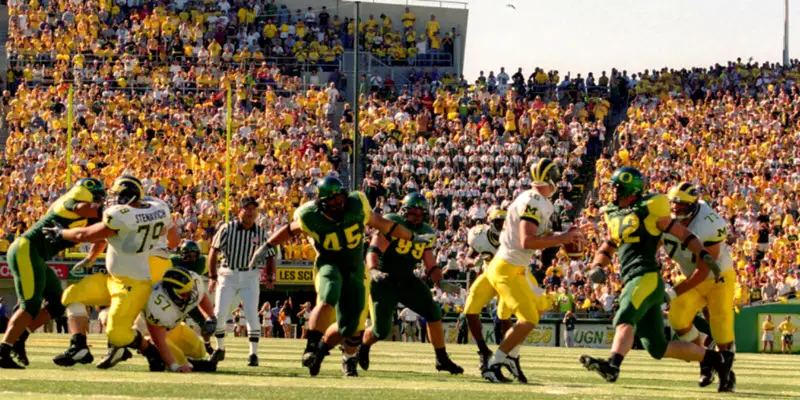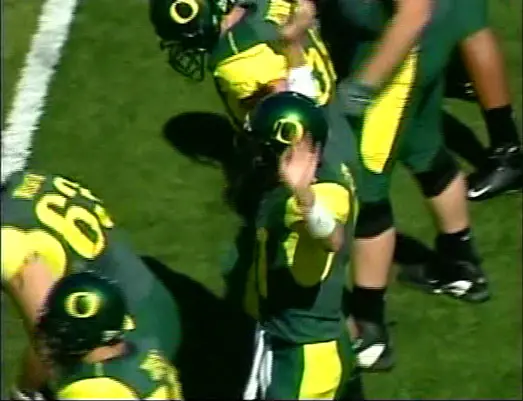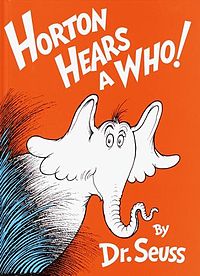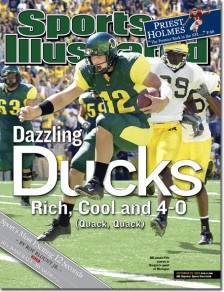
A sack is coming against Michigan, 2003.
(We are all indebted to John Giustina who has donated his vast collection of Oregon pictures.
What is the greatest day of your life?
I know what I would say, but how would most people answer this question? If you are a parent, you would likely say the day your child was born. If you are married, you would probably say your wedding day. I am getting married in July, which matters because for the first time in nine years, there is the serious possibility of changing my answer from what I tell people now: September 20, 2003, or as it is better known to Duck fans, “The Day Oregon Beat Michigan at Autzen Stadium.”
To this day, it still amazes me that the game was even played. Getting a program as relevant as Michigan to schedule a home-and-home would have been difficult for any school, but for one that had spent the previous decade making a regular tradition of beating Big Ten teams at Autzen Stadium (see: Iowa in ’94, Illinois in ’95, Michigan State in ’98, Wisconsin in ’01) made it even more amazing. So when the teams agreed to meet in 2002 and 2003, Oregon fans were elated.
However, Michigan chose to delay the scheduled 2002 game to 2007, not wanting the defending Pac-10 champions to disrupt their national championship aspirations. Yet optimism remained, as the 2003 game stayed on the schedule, becoming a date all Oregon fans circled in red. The Ducks weren’t just playing a traditional blueblood in a down year; this was a Michigan team ranked third in the country. For Oregon, this was the first relevant non-conference game since their breakout 2001 season, when Wisconsin came to Eugene, and after a disappointing finish to 2002, the Ducks wanted to show that it still belonged in the college football discussion.
I remember walking to Autzen Stadium on that gorgeous Eugene day, my friends and I all charged up the same way. “We’re going to play Michigan today.” By the time we got to our seats we realized that we weren’t the only ones feeling that way, finding 59,000 others just as electric as we were. So when Kellen Clemens had to quiet the crowd on the very first play, it was obvious Duck fans knew this was much more than just another game…
Oregon started with the ball, going on a methodical nine-minute drive, converting third down after third down after third down. When the Ducks finally got stopped on third down, they converted on fourth down. They worked their way to the 1, where the Ducks successfully converted another third down on a Kellen Clemens option run for the TD.
Except…the officials ruled that he didn’t. This was 2003, and college football didn’t use instant replay until 2006, which meant that a play where Clemens clearly scored by rolling over a Michigan player was incorrectly called fourth down. After a subsequent false start penalty negated their hopes of converting on fourth down, the field goal team was brought on. The crowd, still bothered by the poor call at the goal line, took comfort in the way that Oregon so effortlessly moved the ball against the vaunted Wolverine defense.
And then, the air went out of the balloon.
Michigan blocked the field goal attempt, running it back for a touchdown. 59,000 silent fans shared the same thought: WHAT just happened? Oregon had just spent the better part of the first quarter working the ball down the field at will, then had a touchdown taken away on a bad call, and now Michigan, which had done nothing all day, was ahead?!?
What made this game different than previous emotional rollercoasters experienced at Autzen Stadium was the crowd’s relentless, unflappable enthusiasm, remaining at full-throated fever pitch from start to finish. Michigan coach Lloyd Carr was interviewed shortly before kickoff, responding to a question he could barely hear simply said, “this is the loudest stadium I’ve ever been in.” Those words would prove not only valid, but immortalized in the words of the Michigan student newspaper in the aftermath of the day’s events.
Another perceived moment of referee bias beyond the Clemens no-TD call drew additional vitriol from the fans, when Oregon running back Chris Vincent was hit well out of bounds but drew no penalty flag. A strong 2nd quarter drive resulted in a Terrance Whitehead TD, breaking open a flood gate of huge plays. A botched Michigan fake punt led to an iconic, SI-cover-worthy touchdown scamper from Jason Fife 49 seconds later.
Michigan’s next series was a three-and-out, resulting in a recovered fumble, tackle for a loss and a sack in successive downs and punted. The resulting punt would prove to be an iconic game-changing moment, as Steven Moore found a seam and returned it for a touchdown, making it appear that the Ducks were going to roll over the highly-ranked Wolverines.
Despite all of Oregon’s early success, Michigan had closed the game to 24-21 with eleven minutes remaining, scoring a touchdown and two-pointer after a delay of game penalty gave Michigan another chance to convert on fourth down. What happened after that was something that I have never experienced before or since at a football game. At most games, when the other team gets rolling, the crowd remains muted until its team does something worthy of getting the crowd back in the game.
This was the one time I saw a crowd rally itself as though a member of the team, a true 12th man. They were watching their team, one that had thoroughly outplayed Michigan all day, at risk of losing this game, a statement game no less, and became determined to make sure they did their part as a fan. In that moment, I thought of a childhood lesson, learned from Dr. Seuss’ H orton Hears a Who!, when the mayor of Whoville tells his citizens on the brink of extinction,
orton Hears a Who!, when the mayor of Whoville tells his citizens on the brink of extinction,
“We’ve GOT to make noises in greater amounts!
So, open your mouth, lad! For every voice counts!”
It was in that moment that I began to yell, and clap, and stomp, and thought “how can I make more noise?”, only to be disappointed that I lacked the means to do so, so instead I dug down and yelled even louder. Then I looked around and saw everyone in our section, and everyone I could see in the stadium, was doing the exact same thing.
As determined as the fans were to win that day, Keith Lewis was more determined. After a near interception on third down forced a Michigan punt, Lewis got pressure on the edge. Michigan punter Adam Finley got the kick away…right into Lewis’ helmet. Eight seconds passed between the ball contacting Lewis’ helmet and the eventual touchdown. As any bullrider can tell you, sometimes, eight seconds can be an eternity. In between, Ryan Shaw and J.D. Nelson took turns trying to corral the ball, only to see it stay live.
Not until freshman Jordan Carey finally dived on the ball did the momentum swing back Oregon’s way. With a ten-point lead and seven minutes to go, Duck fans were starting to believe that it might be their day. Two minutes later, Justin Phinisee ended another deep Michigan drive, making it all but certain that Oregon would win the game.
As certain as victory was starting to feel, finishing Michigan off would prove to be the day’s biggest challenge. Oregon had a first down negated by a penalty, then would turn the ball over a bizarre fourth down run play. Taking advantage of the crowd’s confused silence, the Wolverines stormed down the field. Forty seconds later, Michigan wide receiver Steve Breaston had broken a tackle and scored a touchdown. If the Wolverines converted the extra point, they would need only a field goal to tie the game. Igor Olshansky made sure that wasn’t an issue, coming up with a crucial PAT block. Down by four, only in the highly unlikely scenario that Michigan recovered the onside kick and scored a touchdown would they be able to pull out the win.
Only problem was, the Wolverines did the first part. Now they were only 56 yards away, a mere hail mary’s distance, from stealing a game they had no business winning. Once again, the crowd turned it up, and when Michigan quarterback John Navarre sailed his 55th pass of the day over receiver Braylon Edwards’ head on 4th-and-7, the Autzen faithful rejoiced. By the time the clock reached zero, Michigan became the highest-ranked team Oregon had ever defeated.
As time passes, the statement nature of that game fades. In a football context, the game itself was nearly meaningless, as Michigan still went on to win its conference and play in the Rose Bowl, something it would have done whether or not it beat Oregon. Oregon built on its success and has had many signature wins since. Suddenly, Sports Illustrated was calling the Ducks “Rich, Cool and 4-0”. The optimism from that game would last an entire week, the following Saturday the Ducks would suffer a disastrous home loss to Washington State.
That day, Oregon had nine turnovers, including seven interceptions, trailed 38-2 at half and lost 55-16, in a game that wasn’t even that close. Samie Parker would later say, “that’s the only time I have ever heard the locker room silent before a game.” It was the beginning of the end on a once promising Oregon season that ended with a last-minute loss to Minnesota in the Sun Bowl. Yet in an otherwise average year, the Michigan game stands out as a validation of the Oregon program, a watershed moment in history.
What stays with me from that day isn’t something that can be understood by reading a box score. It went beyond attending a football game; it was about experiencing the unification of a fan base. Each fan feeling compelled to do their part in helping the team to victory. Usually the best hope for a crowd is that they create a little havoc for the opponent, but on that day, the crowd acted as a member of the team. It was the collective understanding of a fan base that every voice counts.
Recently, a friend asked me about the commitment, both time and financial, I had put into attending all the home games and bowl trips the last few years. He asked, “Is it really worth it? You can see everything better on the TV, anyway.” I tried to explain that it went beyond just watching a game, that as a fan, I have those tickets because I believe I can cheer louder than anyone else who might sit in those seats, and that I am contributing, no matter how infinitesimally, to my team’s victory. It is a lesson I learned on the greatest day of my life, about what it means to truly be a fan.
The next day the writer J. Brady McCullough of the Michigan Daily (student newspaper) summed it all up in a more eloquent fashion than has ever been said or could ever be replicated, the words of his summary article recapping Michigan’s downing at the hands of the Ducks now permanently etched in memory to fans on par with immortal statements like “Kenny Wheaton’s gonna score!” and “It never rains at Autzen Stadium!”
…Autzen Stadium is where great teams go to die.
“Sitting in the foothills of the Cascade Mountains, Oregon’s Autzen Stadium is one of college football’s hidden jewels. Before kickoff, Autzen is as peaceful as the Willamette River, which runs through Eugene just a few minutes from the stadium. After kickoff, the fans – even the alumni – forget who they are, where they come from and what their degree is in. The audience adopts a new collective identity for the next three-and-a-half hours: the 12th, 13th and 14th man.
Autzen’s 59,000 strong make the Big House collectively sound like a pathetic whimper. It’s louder than any place I’ve ever been, and that includes “The Swamp” at Florida, “The Shoe” in Columbus and “Death Valley” at Louisiana State. Autzen Stadium is where great teams go to die.”
-J. Brady McCullough, the Michigan Daily
September 21st, 2003
—
Related Articles:
Nathan Roholt is a senior writer and managing editor emeritus for FishDuck. Follow him on Twitter @nathanroholt. Send questions/feedback/hatemail to nroholtfd@gmail.com.
